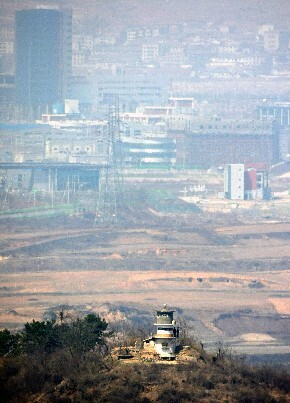hankyoreh
Links to other country sites 다른 나라 사이트 링크
N. Korea and Japan exchange retaliatory warnings regarding launch

With North Korea’s into to launch a “satellite” into orbit entering the countdown stage, a battle of wills between North Korea and Japan, as well as other nations, looms large. While the Japanese government makes gestures that some analysts indicate may be intended to exploit North Korea’s launching of a satellite as a political pawn to improve approval ratings, North Korea attempts to minimize the aftermath.
In an “important announcement” on April 2, a spokesman for the General Staff of North Korea’s military said, “It is the Japanese reactionaries, the sworn enemy of the Korean people, who are perpetrating the most evil doings over the DPRK’s (North Korea’s) projected peaceful satellite launch.” The representative of the Korean People’s Army also added If Japan recklessly ‘intercepts’ the satellite, it will “mercilessly deal deadly blows not only at the already deployed intercepting means but at major targets.” North Korea also warned South Korea and the United States, however with taking a softer tone, saying they should immediately withdraw its already deployed armed forces if it does not wish to be hurt” and ”should refrain from disturbing the launch.“
Analysts suggest North Korea’s “important announcement” is seen as a bluff against a bluff. Japan’s order to shoot down North Korea’s “satellite” is based on the presumption that the satellite or any of its debris falls onto its soil after failing to make it into orbit. If the “satellite” launched proceeds successfully as North Korea anticipates, there would be little reason for Japan to shoot down it. The announcement is seen as a justified retaliatory move against the Japanese government, who is at the forefront of advocating for hawkish actions against North Korea, including interception and sanctions.
No one is certain, however, that the situation will result in a mere war of words because North Korea has moved a squadron of MiG-23 fighter jets to a base near the launch site in what has appeared to be a response to Japan’s deployment. Experts suggest that In the worst-case scenario, if Japan shoots down North Korea’s “satellite,” North Korea’s MiG-23 fighter jets could attack Japan and South Korea’s Aegis-equipped destroyers, which were deployed Saturday to the East Sea. They also indicate that the possibility of an accidental conflict cannot be ruled out, for instance if North Korea’s MiG-23 fighter jets try to block access to U.S. spy planes.
Kim Byeong-yong, a researcher at the Korea Institute for Defense Analyses, a South Korean think tank, believes that North Korea’s launch may succeed, given its experiences gained from launches of its Taepodong-1 and Taepodong-2 missiles as well as technological cooperation with Iran, which successfully launched a satellite in February. Moreover, Kim, who spoke recently at an academic forum organized by the Institute for National Security Strategy, says he does not believe North Korea has secured technology to miniaturize a nuclear warhead, or developed a reentry technique for intercontinental ballistic missiles.
Please direct questions or comments to [englishhani@hani.co.kr]
Editorial・opinion
![[Column] Season 2 of special prosecutor probe may be coming to Korea soon [Column] Season 2 of special prosecutor probe may be coming to Korea soon](https://flexible.img.hani.co.kr/flexible/normal/500/300/imgdb/original/2024/0426/3317141030699447.jpg) [Column] Season 2 of special prosecutor probe may be coming to Korea soon
[Column] Season 2 of special prosecutor probe may be coming to Korea soon![[Column] Park Geun-hye déjà vu in Yoon Suk-yeol [Column] Park Geun-hye déjà vu in Yoon Suk-yeol](https://flexible.img.hani.co.kr/flexible/normal/500/300/imgdb/original/2024/0424/651713945113788.jpg) [Column] Park Geun-hye déjà vu in Yoon Suk-yeol
[Column] Park Geun-hye déjà vu in Yoon Suk-yeol- [Editorial] New weight of N. Korea’s nuclear threats makes dialogue all the more urgent
- [Guest essay] The real reason Korea’s new right wants to dub Rhee a founding father
- [Column] ‘Choson’: Is it time we start referring to N. Korea in its own terms?
- [Editorial] Japan’s rewriting of history with Korea has gone too far
- [Column] The president’s questionable capacity for dialogue
- [Column] Are chaebol firms just pizza pies for families to divvy up as they please?
- [Column] Has Korea, too, crossed the Rubicon on China?
- [Correspondent’s column] In Japan’s alliance with US, echoes of its past alliances with UK
Most viewed articles
- 1[Column] Season 2 of special prosecutor probe may be coming to Korea soon
- 2‘We must say no’: Seoul defense chief on Korean, USFK involvement in hypothetical Taiwan crisis
- 3Is N. Korea threatening to test nukes in response to possible new US-led sanctions body?
- 4Amnesty notes ‘erosion’ of freedom of expression in Korea in annual human rights report
- 5Division commander ordered troops to enter raging flood waters before Marine died, survivor says
- 6N. Korean delegation’s trip to Iran shows how Pyongyang is leveraging ties with Moscow
- 7[Editorial] Korea’s surprise Q1 growth requires objective assessment, not blind fanfare
- 8Is Japan about to snatch control of Line messenger from Korea’s Naver?
- 9No good, very bad game for Korea puts it out of Olympics for first time since 1988
- 10[Reportage] On US campuses, student risk arrest as they call for divestment from Israel